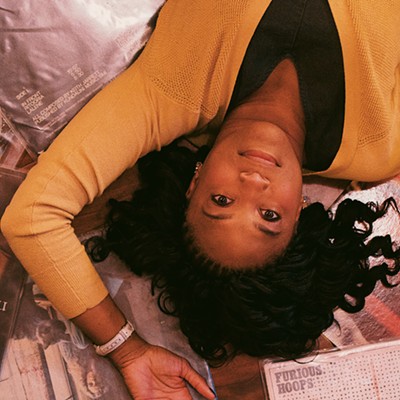Growing up is hard for everybody. But in an all-too-common story, adolescence becomes treacherous when a family member resorts to molestation.
Playwright Paula Vogel was awarded not only a Pulitzer Prize for her play How I Learned to Drive, but also the Obie, the Drama Desk Award, the New York Drama Critics’ Award and the Outer Circle Critics Award.
The play is being presented by the Armstrong Atlantic State University student theater troupe, the Masquers, Sept. 20-23. “It involves a 30-year-old woman who reflects on her adolescence,” says director Pam Sears. “It’s a memory play.”
Li’l Bit, the nickname given to the main character, grows up in rural Maryland during the 1960s. Her large extended family includes her mother’s sister’s husband, Uncle Peck.
The name of the play comes from an incident when Li’l Bit is 11. Uncle Peck gives her a driving lesson, but he also uses the opportunity to molest her.
Despite the abuse, which continues over the years, Li’l Bit feels an odd kinship with Uncle Peck. The two of them are outsiders in their family, and Li’l Bit feels her uncle is the only one who truly cares about her.
In some ways, Li’l Bit’s adolescence is normal. “As we all do, she goes through a period of being self-conscious, and not trusting people,” Sears says.
But it also is abnormal. “She has a particularly strange relationship with her uncle,” Sears says. “In the end, she forgives him. Because of her relationship with him, she ends up forgiving her family.”
While the subject matter certainly is serious, the play does have several instances of comedy in it, and there also are some moving moments. It is clearly intended for adult audiences, so don’t bring the kids.
“I’ve always loved the show,” Sears says. “These roles are really challenging.”
Sage Tipton plays Li’l Bit, Jonathan Iler is Uncle Peck and Michelle Spekete, Barry Kennedy Jr. and Megan Meadows portray the female Greek chorus, the male Greek chorus and the teen Greek chorus.
“The other three play multiple roles,” Sears says. “The way the show is crafted, it skips back and forth in time. There’s a slide show during the performance.
“This play is very interesting and interactive for the audience,” she says. “Her driving lessons are a metaphor for her lessons in life. They are a rite of passage to womanhood. As she is learning to drive, she is learning a lot about herself.”
As the male Greek chorus, Kennedy plays five different parts. “I’m a waiter, a grandfather, a small nerdy boy, another boy and a neutral narrator,” he says. “Those roles help paint a picture in the audience’s eyes. I help build the scenes.”
While it’s challenging to portray five different personalities, Kennedy says it’s not really hard. “These characters are people I’m related to or been in touch with before,” he says.
A senior theater major, Kennedy transferred to AASU last year from Savannah State University. He has appeared in several local productions, including Let My People Go, A Raisin in the Sun and Six Degrees of Separation.
Kennedy says he’s always been interested in acting. “I watched actors on TV and said, ‘I could do that,’” he says. “As I learned the craft, I became more appreciative of acting.”
Next February, Kennedy plans to go to New York City to audition for stage roles. “I hope to get a few call-backs or offers,” he says. “I definitely want to pursue performing.”
Audiences will enjoy How I Learned to Drive, despite its intense subject matter, Kennedy says. “It’s a show that will hit home for a lot of people,” he says. “It’s a show people can easily relate to.”
As Li’l Bit, Tipton tells her character’s story. “She relives the story of how she grew up with her family and her uncle,” Tipton says.
“I love the story,” she says. “They understand each other. She feels her family doesn’t understand her and she has a tough time at school.”
Tipton tries not to portray Li’l Bit as a victim. “It’s a complex character,” she says. “I’ve been frustrated with a few scenes, but you have to let go and have fun with it.
“The story can reach out and touch people on several levels,” Tipton says. “It’s comedic, dramatic and hits everyone on every level.”
Iler has perhaps the most difficult task of all — making a pedophile sympathetic. My character is a war hero,” he says. “He was in World War II in the Pacific Theater.
“He has a very close relationship with his niece,” Iler says. “He’s a pedophile, but at the same time, he’s in love with her.
“Over 10 or 11 years, he tries to culture a relationship with her and tries to manipulate her,” he says. “He waits until her 18th birthday, hoping to marry her.”
Everyone else in the family sees Uncle Peck as charismatic and suave, and Li’l Bit’s mother and aunt refuse to see his true nature.
“As a kid, he was molested himself,” Iler says.
“He’s a very complex, multi-layered. In each scene, I try to glean what is his motive. Scene by scene, I try to figure out what the character is thinking and how he operates within the confines of pedophilia. He’s manipulative at times, but also genuine at times.”
A sophomore at AASU, Iler originally planned to major in computer science. “It probably wasn’t a very good goal for me,” he says. “I still love computers, but I don’t want it to be my career.”
Iler is interested in films and filmmaking. After graduation, he plans to move to Florida and seek opportunities for acting and filmmaking.
“I work at WTOC,” Iler says. “Television is my backup, until I get acting roles.”
Although Iler thinks How I Learned to Drive is a good play, he doesn’t believe it’s for everyone.
“If you have any hang-ups with the subject matter, you might want to steer clear,” he says. “It’s not graphic, but it’s clear from the language what his motives are. But he’s not all bad.”
How I Learned to Drive will be presented Sept. 20, 21 and 22 at 7:30 p.m. and Sept. 23 at 3 p.m. at Armstrong Atlantic State University’s Jenkins Theater. Tickets are $8. For tickets, call the AASU Fine Arts Box Office at 927-5381 weekdays between 11 a.m. and 3 p.m.



























